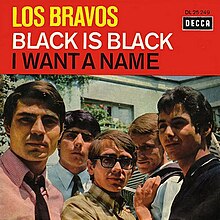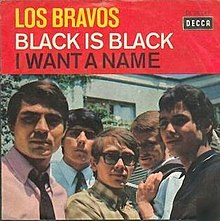Rock and roll music

From Wikipedia, the free encyclopedia
Leer más
Álbums chronology
Los Bravos - Black Is Black
Los Bravos
Label: Decca (UK)Press (US) · · Productor: Ivor Raymonde
|
1
|
Black is black
Los Bravos •
• 1966
|
2:59 |
|
|
|
2
|
Trapped
Los Bravos •
• 1966
|
2:24 |
|
|
|
3
|
Baby, Baby
Los Bravos •
• 1966
|
1:59 |
|
|
|
4
|
Make It Easy For Me
Los Bravos •
• 1966
|
2:46 |
|
|
|
5
|
She Believes In Me
Los Bravos •
• 1966
|
3:09 |
|
|
|
6
|
I Want A Name
Los Bravos •
• 1966
|
2:42 |
|
|
|
7
|
I Don't Care
Los Bravos •
• 1966
|
2:19 |
|
|
|
8
|
Stop That Girl
Los Bravos •
• 1966
|
2:39 |
|
|
|
9
|
I'm Cuttin' Out
Los Bravos •
• 1966
|
3:05 |
|
|
|
10
|
Don't Be Left Out In The Cold
Los Bravos •
• 1966
|
2:18 |
|
|
|
11
|
You Won't Get Far
Los Bravos •
• 1966
|
2:22 |
|
|
|
12
|
Baby Believe In Me
Los Bravos •
• 1966
|
2:20 |
|
Singles
No singles available
Singles
| "Black Is Black" | ||||
|---|---|---|---|---|
 | ||||
| Single by Los Bravos | ||||
| from the album Black Is Black | ||||
| B-side | "I Want a Name" | |||
| Released | July 1966[1] | |||
| Genre | Beat, psychedelic rock | |||
| Length | 2:59 | |||
| Label |
| |||
| Songwriter(s) | Michelle Grainger, Tony Hayes, Steve Wadey | |||
| Producer(s) | Ivor Raymonde | |||
| Los Bravos singles chronology | ||||
| ||||
| Black Is Black (`86 Dance Mix) | ||||
 | ||||
| Music video | ||||
| "Black Is Black" on YouTube | ||||
Review
From Wikipedia, the free encyclopedia
Leer más
1966 single by Los Bravos
For the song by Amanda Stott, see Black Is Black (Amanda Stott song).
You can help expand this article with text translated from the corresponding article in Spanish. (April 2022) Click [show] for important translation instructions.
|
"Black Is Black" is a song by the Spanish rock band Los Bravos, released in 1966 as the group`s debut single for Decca Records. Produced by Ivor Raymonde, it reached number two in the UK,[2] number four in the US,[3] and number one in Canada.[4] With the recording`s success, Los Bravos became the first Spanish rock band to have an international hit single.[5] A dance remix was released as a single in 1986.
Background
Four members of Los Bravos — bassist Miguel Vicens Danus, guitarist Tony Martinez, organist Manuel Fernández, and drummer Pablo Sanllehi — had previously worked together in the Spanish band Los Sonors.[6] Together with German-born singer Michael Kogel (aliases: Mike Kennedy, Mike Keller), the group set out to achieve success in the European market making English-language pop music.[6] After signing with the Spanish division of Decca Records, the band went to England to work with Ivor Raymonde, a British producer, arranger, conductor, and composer, who had been involved in making UK hit songs with such artists as Marty Wilde, Billy Fury, and Dave Berry.[6] "Black Is Black" was released in 1966 as the band`s first Decca single.[6]
According to the liner notes of Black Is Black: The Anthology 1966–1969 (2017), the song features the band members in "largely token roles behind Kogel`s lead vocal", as well as contributions from session musicians Vic Flick and John McLaughlin.[7]
Reception
As lead singer Kogel was not a native English speaker (he had to have the lyrics written out phonetically), his vocals had unusual intonations. By coincidence, his vocal style sounded similar to that of Gene Pitney, so much so that many listeners assumed that "Black Is Black" was actually a Pitney single.[8][9]
In August 1966, the song debuted at number 100 on the U.S. Billboard Hot 100 singles chart.[10] It peaked at number four in October,[11] and spent 12 weeks on the chart.[3] It reached number one on the Canadian Singles Chart, and peaked at number two in the UK Singles Chart.[2] The single also sold two million copies in Spain.[12]
Shortly after the September 11, 2001 attacks, American media conglomerate company Clear Channel Communications distributed the 2001 Clear Channel memorandum to program directors at the more than 1000 radio stations the company owned.[13] The memo contained a list of 162 songs with "questionable lyrics" that the stations should avoid playing, which included "Black Is Black".[13]
Other notable versions
| "Black Is Black" | ||||
|---|---|---|---|---|
| Single by La Belle Epoque | ||||
| from the album Miss Broadway | ||||
| B-side | "Me and You" | |||
| Released | 30 July 1977 | |||
| Genre | Disco | |||
| Length | 4:24 | |||
| Label | Polydor | |||
| Songwriter(s) | Michelle Grainger, Tony Hayes, Steve Wadey | |||
| Producer(s) | Prima Linea | |||
| La Belle Epoque singles chronology | ||||
| ||||
| Music video | ||||
| "Black Is Black" (TopPop 1977) on YouTube | ||||
| "Noir c`est noir" | ||||
|---|---|---|---|---|
| Single by Johnny Hallyday | ||||
| from the album La Génération perdue | ||||
| Language | French | |||
| B-side | "La Génération perdue" | |||
| Released | 20 September 1966 | |||
| Recorded | September 1966 | |||
| Genre | Pop rock | |||
| Length | 3:10 | |||
| Label | Philips | |||
| Songwriter(s) | Michelle Grainger, Tony Hayes, Steve Wadey, Georges Aber | |||
| Producer(s) | Lee Hallyday | |||
| Johnny Hallyday singles chronology | ||||
| ||||
| Music video | ||||
| "Noir c`est noir" on YouTube | ||||
A French version of the song, entitled "Noir c`est noir", was recorded by Johnny Hallyday and held the number one spot on France`s singles chart for seven weeks in the fall of 1966.[14][better source needed]
It was also covered by French vocal trio La Belle Epoque as a disco song, and released as a 1977 single.[15][better source needed] It peaked at number two in the UK,[16] and reached number one in Australia in October 1978.[citation needed]
Chart performance
Weekly chartsLos Bravos
| Year-end charts
|
La Belle Epoque version
|
|
Johnny Hallyday version (in French)
| Chart (1966) | Peak position |
|---|---|
| France (SNEP) | 1 |
| Turkey (TML) | 8 |
| Belgium (Ultratop 50 Wallonia) | 5 |
From Wikipedia, the free encyclopedia
1966 single by Los Bravos
For the song by Amanda Stott, see Black Is Black (Amanda Stott song).
You can help expand this article with text translated from the corresponding article in Spanish. (April 2022) Click [show] for important translation instructions.
|
"Black Is Black" is a song by the Spanish rock band Los Bravos, released in 1966 as the group`s debut single for Decca Records. Produced by Ivor Raymonde, it reached number two in the UK,[2] number four in the US,[3] and number one in Canada.[4] With the recording`s success, Los Bravos became the first Spanish rock band to have an international hit single.[5] A dance remix was released as a single in 1986.
Background
Four members of Los Bravos — bassist Miguel Vicens Danus, guitarist Tony Martinez, organist Manuel Fernández, and drummer Pablo Sanllehi — had previously worked together in the Spanish band Los Sonors.[6] Together with German-born singer Michael Kogel (aliases: Mike Kennedy, Mike Keller), the group set out to achieve success in the European market making English-language pop music.[6] After signing with the Spanish division of Decca Records, the band went to England to work with Ivor Raymonde, a British producer, arranger, conductor, and composer, who had been involved in making UK hit songs with such artists as Marty Wilde, Billy Fury, and Dave Berry.[6] "Black Is Black" was released in 1966 as the band`s first Decca single.[6]
According to the liner notes of Black Is Black: The Anthology 1966–1969 (2017), the song features the band members in "largely token roles behind Kogel`s lead vocal", as well as contributions from session musicians Vic Flick and John McLaughlin.[7]
Reception
As lead singer Kogel was not a native English speaker (he had to have the lyrics written out phonetically), his vocals had unusual intonations. By coincidence, his vocal style sounded similar to that of Gene Pitney, so much so that many listeners assumed that "Black Is Black" was actually a Pitney single.[8][9]
In August 1966, the song debuted at number 100 on the U.S. Billboard Hot 100 singles chart.[10] It peaked at number four in October,[11] and spent 12 weeks on the chart.[3] It reached number one on the Canadian Singles Chart, and peaked at number two in the UK Singles Chart.[2] The single also sold two million copies in Spain.[12]
Shortly after the September 11, 2001 attacks, American media conglomerate company Clear Channel Communications distributed the 2001 Clear Channel memorandum to program directors at the more than 1000 radio stations the company owned.[13] The memo contained a list of 162 songs with "questionable lyrics" that the stations should avoid playing, which included "Black Is Black".[13]
Other notable versions
| "Black Is Black" | ||||
|---|---|---|---|---|
| Single by La Belle Epoque | ||||
| from the album Miss Broadway | ||||
| B-side | "Me and You" | |||
| Released | 30 July 1977 | |||
| Genre | Disco | |||
| Length | 4:24 | |||
| Label | Polydor | |||
| Songwriter(s) | Michelle Grainger, Tony Hayes, Steve Wadey | |||
| Producer(s) | Prima Linea | |||
| La Belle Epoque singles chronology | ||||
| ||||
| Music video | ||||
| "Black Is Black" (TopPop 1977) on YouTube | ||||
| "Noir c`est noir" | ||||
|---|---|---|---|---|
| Single by Johnny Hallyday | ||||
| from the album La Génération perdue | ||||
| Language | French | |||
| B-side | "La Génération perdue" | |||
| Released | 20 September 1966 | |||
| Recorded | September 1966 | |||
| Genre | Pop rock | |||
| Length | 3:10 | |||
| Label | Philips | |||
| Songwriter(s) | Michelle Grainger, Tony Hayes, Steve Wadey, Georges Aber | |||
| Producer(s) | Lee Hallyday | |||
| Johnny Hallyday singles chronology | ||||
| ||||
| Music video | ||||
| "Noir c`est noir" on YouTube | ||||
A French version of the song, entitled "Noir c`est noir", was recorded by Johnny Hallyday and held the number one spot on France`s singles chart for seven weeks in the fall of 1966.[14][better source needed]
It was also covered by French vocal trio La Belle Epoque as a disco song, and released as a 1977 single.[15][better source needed] It peaked at number two in the UK,[16] and reached number one in Australia in October 1978.[citation needed]
Chart performance
Weekly chartsLos Bravos
| Year-end charts
|
La Belle Epoque version
|
|
Johnny Hallyday version (in French)
| Chart (1966) | Peak position |
|---|---|
| France (SNEP) | 1 |
| Turkey (TML) | 8 |
| Belgium (Ultratop 50 Wallonia) | 5 |



